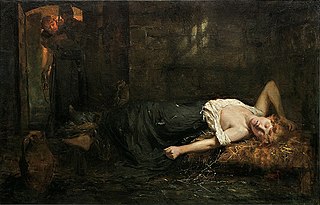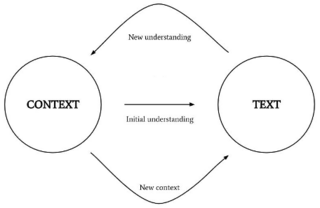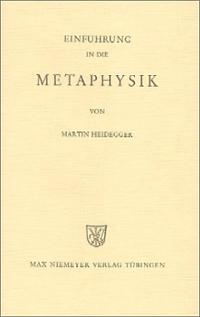
Existentialism ( ) is a form of philosophical inquiry that explores the problem of human existence and centers on the subjective experience of thinking, feeling, and acting. Existentialist thinkers frequently explore issues related to the meaning, purpose, and value of human existence. In the view of an existentialist, the individual's starting point has been called "the existential angst", a sense of dread, disorientation, confusion, or anxiety in the face of an apparently meaningless or absurd world.

Nihilism is a philosophy, or family of views within philosophy, that rejects generally accepted or fundamental aspects of human existence, such as objective truth, knowledge, morality, values, or meaning. The term was popularized by Ivan Turgenev, and more specifically by Bazarov who is one of the main characters in Fathers and Sons.

Martin Heidegger was a German philosopher who is best known for contributions to phenomenology, hermeneutics, and existentialism. He is among the most important and influential philosophers of the 20th century. He has been widely criticized for supporting the Nazi Party after his election as rector at the University of Freiburg in 1933, and there has been controversy about the relationship between his philosophy and Nazism.
Phenomenology is the philosophical study of the structures of experience and consciousness. As a philosophical movement it was founded in the early years of the 20th century by Edmund Husserl and was later expanded upon by a circle of his followers at the universities of Göttingen and Munich in Germany. It then spread to France, the United States, and elsewhere, often in contexts far removed from Husserl's early work.

In conventional usage, boredom is an emotional and occasionally psychological state experienced when an individual is left without anything in particular to do, is not interested in their surroundings, or feels that a day or period is dull or tedious. It is also understood by scholars as a modern phenomenon which has a cultural dimension. "There is no universally accepted definition of boredom. But whatever it is, researchers argue, it is not simply another name for depression or apathy. It seems to be a specific mental state that people find unpleasant—a lack of stimulation that leaves them craving relief, with a host of behavioral, medical and social consequences." According to BBC News, boredom "...can be a dangerous and disruptive state of mind that damages your health"; yet research "...suggest[s] that without boredom we couldn't achieve our creative feats."
Hedone is the Greek word meaning "pleasure." It was an important concept in Ancient Greek philosophy, especially in the Epicurean school. It is also the root of the English word "hedonism".
Maximilian, Maximillian or Maximiliaan is a male given name.
Phronesis, translated into English by terms such as prudence, practical virtue and practical wisdom, or, colloquially, sense is an ancient Greek word for a type of wisdom or intelligence relevant to practical action. It implies both good judgment and excellence of character and habits, and was a common topic of discussion in ancient Greek philosophy, in ways that are still influential today.

Hubert Lederer Dreyfus was an American philosopher and professor of philosophy at the University of California, Berkeley. His main interests included phenomenology, existentialism and the philosophy of both psychology and literature, as well as the philosophical implications of artificial intelligence. He was widely known for his exegesis of Martin Heidegger, which critics labeled "Dreydegger".
Phenomenology may refer to:
Mou Zongsan was a Chinese philosopher and translator. He was born in Shandong province and graduated from Peking University. In 1949 he moved to Taiwan and later to Hong Kong, and he remained outside of mainland China for the rest of his life. His thought was heavily influenced by Immanuel Kant, whose three Critiques he translated from English, possibly first, into Chinese, and above all by Tiantai Buddhist philosophy.

"The Origin of the Work of Art" is an essay by the German philosopher Martin Heidegger. Heidegger drafted the text between 1935 and 1937, reworking it for publication in 1950 and again in 1960. Heidegger based his essay on a series of lectures he had previously delivered in Zurich and Frankfurt during the 1930s, first on the essence of the work of art and then on the question of the meaning of a "thing", marking the philosopher's first lectures on the notion of art.

Philosopher Martin Heidegger joined the Nazi Party (NSDAP) on May 1, 1933, ten days after being elected Rector of the University of Freiburg. A year later, in April 1934, he resigned the Rectorship and stopped taking part in Nazi Party meetings, but remained a member of the Nazi Party until its dismantling at the end of World War II. The denazification hearings immediately after World War II led to Heidegger's dismissal from Freiburg, banning him from teaching. In 1949, after several years of investigation, the French military finally classified Heidegger as a Mitläufer or "fellow traveller." The teaching ban was lifted in 1951, and Heidegger was granted emeritus status in 1953, but he was never allowed to resume his philosophy chairmanship.
Martin Heidegger, the 20th-century German philosopher, produced a large body of work that intended a profound change of direction for philosophy. Such was the depth of change that he found it necessary to introduce many neologisms, often connected to idiomatic words and phrases in the German language.
Thrownness is a concept introduced by German philosopher Martin Heidegger (1889–1976) to describe humans' individual existences as being 'thrown' (geworfen) into the world.

The hermeneutic circle describes the process of understanding a text hermeneutically. It refers to the idea that one's understanding of the text as a whole is established by reference to the individual parts and one's understanding of each individual part by reference to the whole. The circle is a metaphor for the procedure of transforming one's understanding of the part and the whole through iterative recontextualization.
Heidegger, Haidegger and Heidecker are German-language-derived surname.

Introduction to Metaphysics is a revised and edited 1935 lecture course by Martin Heidegger first published in 1953. The work is notable for a discussion of the Presocratics and for illustrating Heidegger's supposed "Kehre," or turn in thought beginning in the 1930s—as well as for its mention of the "inner greatness" of Nazism. Heidegger suggested the work relates to the unwritten "second half" of his 1927 magnum opus Being and Time.
Being There is a 1979 film directed by Hal Ashby.
The Black Notebooks are a set of 34 notebooks written by German philosopher Martin Heidegger (1889–1976) between October 1931 and 1970. Originally a set of small notebooks with black covers in which Heidegger jotted observations. The size of the Black Notebooks are small about 5 1/4 × 7 1/2 inches . Approximately DIN format D5. Editors notes GA 97: page 525.







